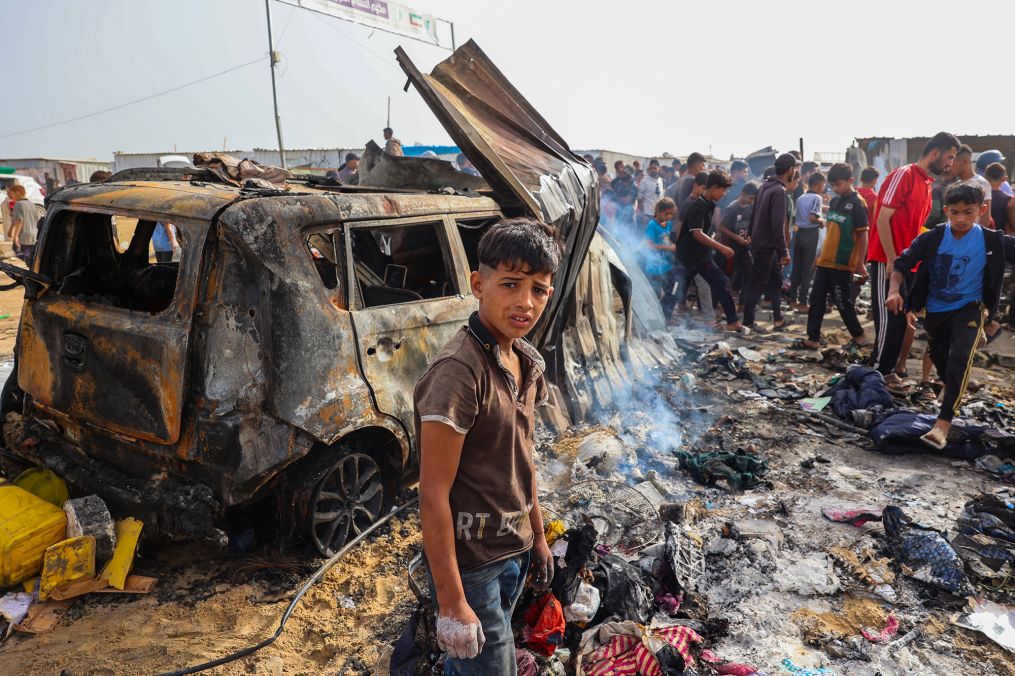Protesters gathered for the second consecutive evening in Paris's Republic Square to denounce the ongoing Israeli bombings in Rafah. The square was adorned with Palestinian flags and a large banner reading 'Stop the genocide'. The French Jewish Union for Peace (UJFP) displayed their support with the slogan: 'Jews and anti-Zionists, we are for equal rights'. The spirited crowd chanted 'Israel assassin, Macron complicit' and 'We are all children of Gaza'.
Notably present among the demonstrators was LFI Deputy Sébastien Delogu, who had faced exclusion from the National Assembly earlier in the day for brandishing a Palestinian flag. His arrival was met with a standing ovation from the crowd. The incident in the assembly sparked tension, leading to a heated altercation between LFI deputies and other officials.
The recent Israeli bombardments on Rafah have resulted in significant casualties. On Sunday, an airstrike in a camp for displaced individuals in the Tal Al Sultan neighborhood left 45 dead and 249 injured, according to the Hamas Ministry of Health. Another strike on Tuesday reportedly killed 21 people, though the Israeli army denied targeting civilians.
The protests in Paris mirrored broader international outrage. On Monday, 10,000 people had already mobilized in the city, demanding an end to what some describe as a genocide. LFI MP David Guiraud emphasized the urgent need for action, stating that the ongoing events are illegal under international law.
These developments come amid escalating violence in Rafah. An Israeli strike on Monday killed 40 people in a camp, leading to accusations of a 'horrible massacre' by the Palestinian presidency. The strikes have complicated ongoing truce negotiations mediated by Qatar, with international efforts yet to yield a sustainable ceasefire. Qatar warned that continued bombings would hinder mediation efforts.
Israel maintains that its strikes targeted Hamas compounds and were executed with precision based on accurate intelligence. The Israeli military asserts that their operations are legitimate under international law, even as international bodies like the International Criminal Court (ICC) and Amnesty International call for investigations into alleged war crimes.
The geopolitical situation remains tense with Egypt condemning the strikes and refusing to reopen the Rafah crossing under current conditions. Amnesty International has also requested the ICC to investigate Israel for potential war crimes, citing evidence from recent airstrikes.
- The involvement of domestic political figures, like LFI Deputy Sébastien Delogu, highlights the deep divisions within France regarding the Israel-Palestine conflict. His actions and subsequent exclusion from the National Assembly underscore the tension and strong sentiments held by various political factions.
- The scale of the protests in Paris reflects a significant public outcry and growing solidarity with the Palestinian cause. Such large-scale mobilizations suggest that international opinion may increasingly influence diplomatic efforts and policy decisions related to the conflict.
- Qatar's role as a mediator underscores the complexity of international diplomacy in achieving a ceasefire. The Gulf nation's involvement emphasizes the need for a multifaceted approach to peacemaking that includes regional actors.
- The accusations of war crimes and the calls for international investigations suggest a long-term impact on Israel’s global standing and the potential for legal ramifications. These developments indicate an elevated level of international scrutiny and pressure surrounding the conflict.





